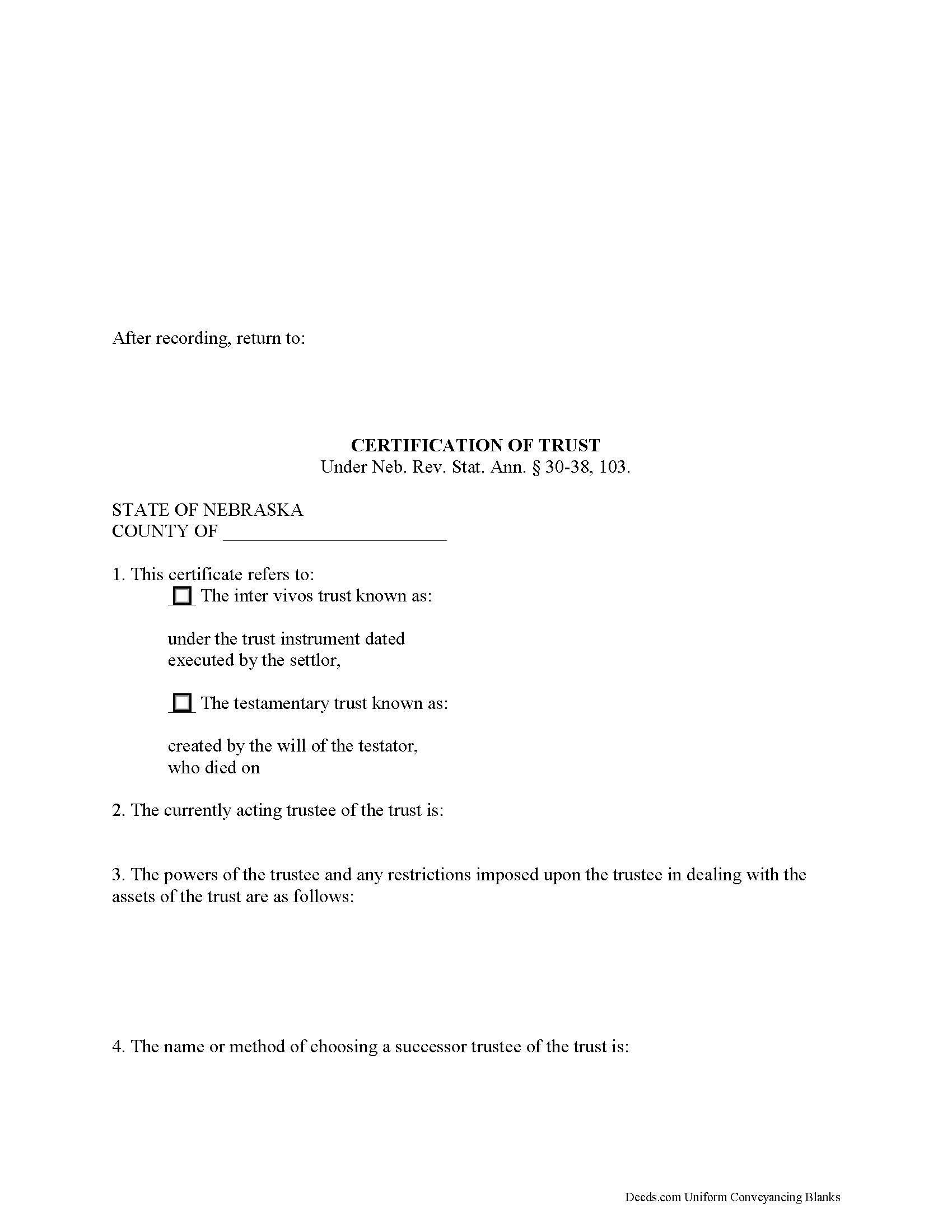Download Nebraska Certificate of Trust Legal Forms

Nebraska Certificate of Trust Overview

The Nebraska certification of trust is codified at Neb. Rev. Stat. Ann. 30-38, 103 and falls under the Nebraska Uniform Trust Code, a collection of statutes adopted from the Uniform Trust Code to govern trusts in the State of Nebraska.
In Nebraska, the certification of trust is an affidavit signed by each acting trustee of the trust, containing sworn statements made in the presence of a notary public. The certificate verifies the existence of the trust and is an abstract of relevant provisions of the trust in lieu of the entire trust instrument.
The document may be presented by a trustee or requested by any person doing business with a trustee, particularly in transactions involving real property (though failure to request a certificate of trust is not considered an "improper act" under 30-38,106). As the trust itself cannot hold title, the trustee acts as a representative of the trust. When the transaction for which the certificate of trust is presented or requested involves real property, the legal description of the parcel subject to the transaction should be included.
The certificate of trust may be used by trustees of both living trusts and testamentary trusts. For a living trust, the certificate requires the date of the trust instrument's execution and the identity of the trust's settlor. For a testamentary trust, the certificate gives the death date of the decedent and the testator's identity. In Nebraska, a certificate of trust requires the identity of the beneficiary or beneficiaries of the trust and their relationship to the settlor or testator, as well.
Essential information contained in the certificate includes the name of the currently acting trustee and a description of the trustee's relevant powers, and any restrictions on those powers in dealing with the trust's assets. In addition, the certificate identifies any successor trustee named by the trust instrument (or will, in the case of a testamentary trust), or the procedure given for choosing a successor trustee, if any exists.
If more than one person is an appointed trustee, the document requires details regarding co-trustees' authority to exercise powers. For example, a trust's provisions might specify a single trustee in charge of certain duties, and require that trustee to handle those duties solely. Or, the trust may stipulate that trustees are to act and sign documents jointly.
Additional requirements for the document include the name under which the trust will take and hold assets, the trust's identification number, and the name of the state or other jurisdiction under which the trust was formed. Trusts can further be categorized into revocable or irrevocable trusts, so the certificate should identify whether or not the trust can be revoked, and by whom it is revocable.
Finally, the document requires a notice that the trust has not been revoked or amended so as to cause the statements contained within to be incorrect, and that all the acting trustees have signed the certificate. Recipients of a certificate may rely upon the statements contained within as factual (Neb. Rev. Stat. Ann. 30-38,105). The presentation of a certificate of trust, however, does not prevent the recipient from requesting the excerpts from the trust instrument conferring the relevant powers to act in the pending transaction unto the trustee ( 30-38,104).
Aside from the above requirements, the certificate should meet all prerequisites for recording documents affecting real property in the State of Nebraska. Consult a lawyer with any questions about certifications and trusts in Nebraska, as each situation is unique.
(Nebraska COT Package includes form, guidelines, and completed example)